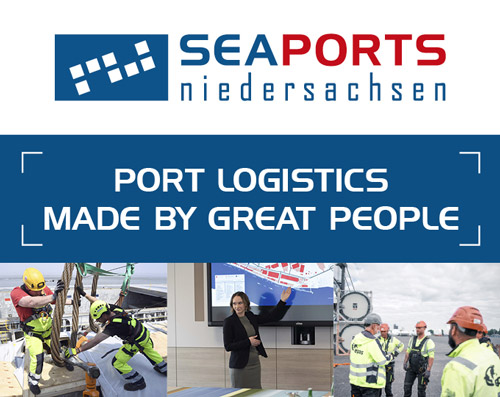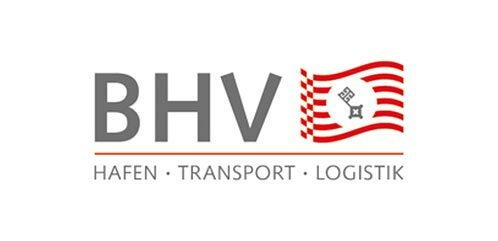Logistics offers a number of career opportunities – from direct entry into the field to a more academic path. Choosing the right path for you depends entirely on your personality and goals. Considering a few questions beforehand can help you achieve your goal. Juliane Bellstedt has completed her training as a shipping agent and works as an operations manager at SAL Heavy Lift. Markus Ahlfeld, Head of Human Resources at Lloyd Werft, describes how different the career paths can be, the experiences that shape them and the advantages and disadvantages of training vs studying.
Credits: Cuxport, bremenports, Privat

“In the port and in logistics, a great deal of flexibility is required.”
Markus Ahlfeld, Head of Human Resources, Lloyd Werft
MARKUS AHLFELD: Vocational training is often a good starting point for young people, as it provides practical experience and integration into the labour market. However, a degree offers deeper theoretical knowledge and can pave the way for more demanding management positions. Whether a degree apprenticeship is considered a good compromise naturally depends on each individual’s plans for their future career. It can also be a great “end goal”, especially as we continue to support our degree apprenticeship students if they progress to Master’s level, for example. Degree apprenticeships have become very well established over the last two decades and are an interesting alternative, as they offer the best of both worlds, combining early practical experience with an academic qualification.
JULIANE BELLSTEDT: I would recommend exploring the many opportunities and areas of activity in the industry as thoroughly as possible. I think vocational training is more useful than a degree for getting started in logistics.
LOGISTICS PILOT: In your opinion, are there reasons for or against vocational training?
AHLFELD: EVocational training has the advantage of being practice-oriented, offering a quick start to a career and, especially today, often providing good opportunities for permanent employment. The disadvantages are that you may acquire less theoretical knowledge and have fewer career advancement opportunities compared to those with a degree. However, not everyone can or should complete a degree, as Germany’s industrial base depends on well-trained skilled workers. Without them, I believe Germany’s future as an industrial hub would be at risk.
BELLSTEDT: In my view, the practical experience you can gain in two-and-a-half to three years is a clear argument in favour of training. As soon as you leave school, you have the opportunity to immerse yourself in a whole new world, take on responsibilities and tackle real and important tasks very quickly. This is quite different from still having to write theoretical assignments or create PowerPoint presentations for the classroom. Another clear advantage of vocational training is that, once you’re finished, you can move straight into a permanent position – sometimes with high levels of responsibility. Of course, this also means that you earn a normal salary from the off. Finally, we shouldn’t forget that in shipping, vocational training is often more useful than a business administration degree or similar. I’d even dare to say that a trained shipping agent would have a much easier time accessing certain roles than someone with a bachelor’s degree.
BELLSTEDT:Well, I was interested in shipping and practical experience rather than academic study. I had already been helping out in my parents’ business while I was at school and always enjoyed working more than sitting in classrooms for hours on end. And I firmly believe that vocational training offers the perfect opportunity to launch your career and that companies in logistics value practical experience.
LOGISTICS PILOT: In your opinion, what are the advantages and disadvantages of a degree course or a degree apprenticeship?
AHLFELD: A degree course or degree apprenticeship has the advantage of providing in-depth theoretical knowledge and offering better career prospects with higher salary prospects. Plus, compared to a “normal” degree programme, a degree apprenticeship combines theory with practice and provides financial support from the company. The disadvantage is that a university-level degree takes longer than an apprenticeship, so you may gain less practical experience. I’d say an academic degree is useful for people who aspire to a management position or who want a deep understanding of processes.
LOGISTICS PILOT: What skills and qualities should prospective employees have if they want to succeed in the port or logistics sector?
BELLSTEDT:Fundamentally, I believe flexibility is one of the most important qualities. Shipping is such a dynamic environment – no two days are the same, and you have to be prepared to adapt quickly to new situations.
AHLFELD: Above all, prospective candidates should have organisational skills. In the port and in logistics, a great deal of flexibility is required. Of course, practical/technical understanding and being good with your hands are also essential. You should also be a team player, independent, persistent and enjoy this type of work. If you really want something, you can move mountains. (js/bre)
“I think vocational training is more useful than a degree for getting started in logistics.”
Juliane Bellstedt, Operations Manager at SAL Heavy Lift






